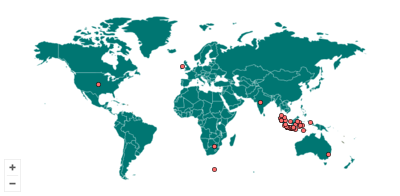PENERAPAN SISTEM PENGELOLAAN RESORT DI KOTA SABANG MENURUT AKAD JI`ALAH: STUDI KASUS THE HAWKS NEST RESORT SABANG
Abstract
This article aims to examine the application of sister resort management in Sabang City according to Akad Ji`alah. The type of research used is qualitative with an empirical juridical approach. Primary data obtained by the author from interviews with the parties concerned and a number of applicable laws and regulations, as well as secondary data that the author gets from the results of research related to this research. The results of the study prove that the application of the resort management system in Sabang City which is here at The Hawk Nest Resort Sabang, namely the application that occurs at The Hawks Nest Resort Sabang City, the owner of the resort here is also the party that submits all the capital and the type of business as well as the location of the business. While the manager only continues the business. At the beginning of the agreement that was carried out was that the resort manager only operated The Hawks Nest Resort Sabang City and later received wages for the work done. In Islam, this kind of practice is called wages. Therefore, the initial agreement between the resort owner and the resort manager did not work properly, resulting in non-compliance with the promised contract. Suggestions for the practice of applying the management system to The Hawk Nest Resort Sabang so that in the future management can be carried out clearly and with Islamic law so as not to cause disputes between parties.
References
Abu Azam Al Hadi. Fikih Muamalah Kontemporer. Depok: Rajagrafindo Persada, 2017.
Ahmad Ifham Sholihin. Buku Pintar Ekonomi Syariah. Jakarta: PT Gramedia Pustaka Utama, 2010.
Ahmad Rofiq. Fiqh Kontekstual dari Normatif ke Pemaknaan Sosial. Yogyakarta: Pustaka belajar, 2004.
Ahmad Wardi Muslich. Fiqh Muamalah. 1 ed. Vol. 4. Jakarta: Amzah, 2017.
Fahmi, Chairul. “Revitalisasi Penerapan Hukum Syariat Di Aceh (Kajian Terhadap UU No.11 Tahun 2006).” Tsaqafah: Jurnal Peradaban Islam 8, no. 2 (3 Mei 2016): 295–309. https://doi.org/10.21111/tsaqafah.v8i2.27.
———. “The Impact of Regulation on Islamic Financial Institutions Toward the Monopolistic Practices in the Banking Industrial in Aceh, Indonesia.” Jurnal Ilmiah Peuradeun 11, no. 2 (30 Mei 2023): 667–86. https://doi.org/10.26811/peuradeun.v11i2.923.
Ghufron Ihsan, dan Dkk. Fiqh Muamalah. Jakarta: Kencana, 2010.
Imam Ghazali Said. Bidayatul Al-Mujtahid. 4 ed. Jakarta: Pustaka Amani, 1995.
Iwandi, Iwandi, Rustam Efendi, dan Chairul Fahmi. “THE CONCEPT OF FRANCHISING IN THE INDONESIAN’S CIVIL LAW AND ISLAM.” Al-Mudharabah: Jurnal Ekonomi Dan Keuangan Syariah 4, no. 2 (29 September 2023): 14–39. https://doi.org/10.22373/al-mudharabah.v5i2.3409.
Mardani. Fiqh Ekonomi Syariah, Fiqh Muamalah. Jakarta: Kencana Prenada Media Group, 2012.
Maulana Hasanudin, dan Jaih Mubarok. Perkembangan Akad Musyarakah. Jakarta: Kencana, 2012.
Moh Maghfur Wachid. Membangun Sistem Ekonomi Alternatif Perspektif Islam. Jakarta: Risalah Gusti, 1996.
Rachmat Syafei. Fiqh Muamalah. 1 ed. Bandung: Pustaka Setia, 2001.
Sumadi Suryabrata. Metode Penelitian. Jakarta: Rajawal, 1988.
Susiadi AS. Metodologi Penelitian. Bandar Lampung: Fakultas Syari’ah IAIN Raden Intan Lampung, 2014.
Yunira Almaisa Sianipar, Cut Dewi, Khairul Huda, dan Khairul Huda. “Perancangan Hotel Resort di Kota Sabang dengan Tema Arsitektur Ekologi.” Jurnal Ilmiah Mahasiswa Arsitektur Dan Perencanaan 6, no. 2 (Mei 2022): 76–80.








